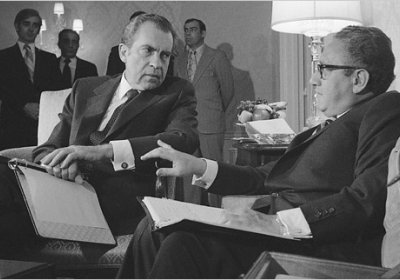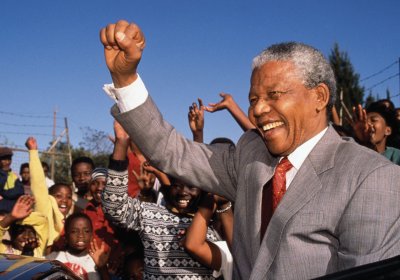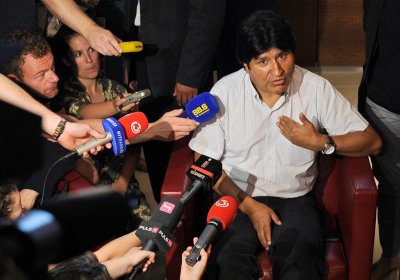The most important anniversary of the year was the 40th anniversary of September 11, 1973 — the crushing of the democratic government of Chile by General Augusto Pinochet and Henry Kissinger, then US secretary of state.
The National Security Archive in Washington has posted new documents that reveal much about Kissinger's role in an atrocity that cost thousands of lives.
In declassified tapes, Kissinger is heard planning with President Richard Nixon the overthrow of left-wing President Salvador Allende. They sound like Mafiosi thugs.
John Pilger
On my wall is the front page of the Daily Express of September 5, 1945, and the words: “I write this as a warning to the world.” So began Australian journalist Wilfred Burchett's report from Hiroshima. It was the scoop of the century.
For his lone, perilous journey that defied the US occupation authorities, Burchett was pilloried, not least by his embedded colleagues. He warned that an act of premeditated mass murder on an epic scale had launched a new era of terror.
I have known my postman for more than 20 years. Conscientious and good-humoured, he is the embodiment of public service at its best. The other day, I asked him, “Why are you standing in front of each door like a soldier on parade?”
“New system,” he replied. “I am no longer required simply to post the letters through the door. I have to approach every door in a certain way and put the letters through in a certain way.”
“Why?”
“Ask him.”
The critical moment in the political trial of the century was on February 28 when Bradley Manning stood and explained why he had risked his life to leak tens of thousands of official files to WikiLeaks.
It was a statement of morality, conscience and truth: the very qualities that distinguish human beings. This was not deemed mainstream news in the United States; and were it not for Alexa O'Brien, an independent freelance journalist, Manning's voice would have been silenced.
When I reported from South Africa in the 1960s, the Nazi admirer Johannes Vorster occupied the prime minister's residence in Cape Town. Thirty years later, as I waited at the gates, it was as if the guards had not changed.
White Afrikaners checked my ID with the confidence of men in secure work. One carried a copy of Long Walk to Freedom, Nelson Mandela's autobiography. “It's very eenspirational,” he said.
Imagine the aircraft of the president of France being forced down in Latin America on “suspicion” that it was carrying a political refugee to safety — and not just any refugee but someone who has provided the people of the world with proof of criminal activity on an epic scale.
In his 1928 book Propaganda, Edward Bernays wrote: “The conscious and intelligent manipulation of the organised habits and opinions of the masses is an important element in democratic society.
“Those who manipulate this unseen mechanism of society constitute an invisible government which is the true ruling power of our country.”
The American nephew of Sigmund Freud, Bernays invented the term “public relations” as a euphemism for state propaganda. He warned that an enduring threat to the invisible government was the truth-teller and an enlightened public.
The dust in Iraq rolls down the long roads that are the desert's fingers. It gets in your eyes and nose and throat; it swirls in markets and school playgrounds, consuming children kicking a ball; and it carries, according to Dr. Jawad Al-Ali, “the seeds of our death”.
An internationally respected cancer specialist at the Sadr Teaching Hospital in Basra, Dr Ali told me that in 1999, and today his warning is irrefutable.
The other day, I stood outside the strangely silent building where I began life as a journalist. It is no longer the human warren that was Consolidated Press in Sydney, though ghosts still drink at the King's Head pub nearby.
As a cadet reporter, I might have walked on to the set of Lewis Milestone's The Front Page. Men in red braces did shout, "Hold the front page", and tilt back their felt hats and talk rapidly with a roll-your-own attached indefinitely to their lower lip. You could feel the presses rumbling beneath and smell the ink.
In the wake of Margaret Thatcher's departure, I remember her victims. Patrick Warby's daughter, Marie, was one of them.
Marie, aged five, suffered from a bowel deformity and needed a special diet. Without it, the pain was excruciating. Her father was a Durham miner and had used all his savings. It was winter 1985, the Great Strike was almost a year old and the family was destitute.
The corporate media will eulogise Margaret Thatcher, and criticise those who dare use her death to point out her many terrible crimes. But among her many crimes that will go unmentioned was the support her government gave in the 1980s to the genocidal Pol Pot-led Khmer Rouge. Below is an article by independent journalist John Pilger on the support the West, including Thatcher, gave the Khmer Rouge. It was first published on April 17, 2000 in the New Statesman. Visit www.johnpilger.com for more articles.
* * *
What is modern propaganda? For many, it is the lies of a totalitarian state.
In the 1970s, I met Leni Riefenstahl and asked her about her epic films that glorified the Nazis. Using revolutionary camera and lighting techniques, she produced a documentary form that mesmerised Germans; her Triumph of the Will cast Hitler's spell.
She told me that the “messages” of her films were dependent not on “orders from above”, but on the “submissive void” of the German public.
Did that include the liberal, educated bourgeoisie? “Everyone,” she said.
- Previous page
- Page 6
- Next page









